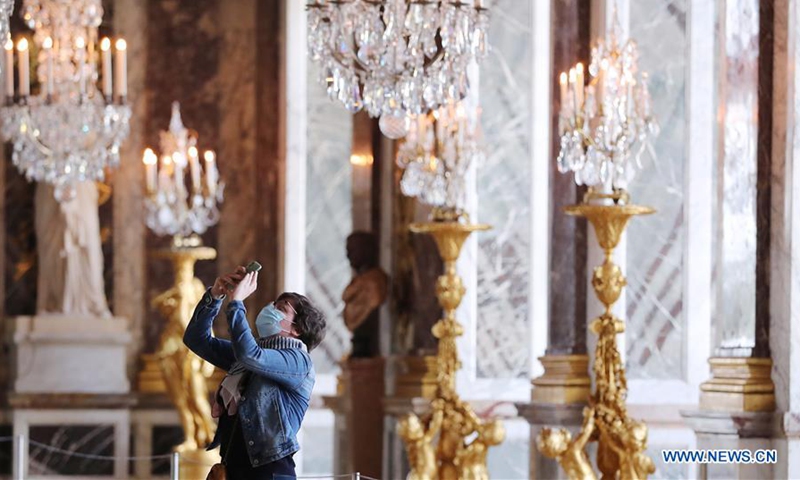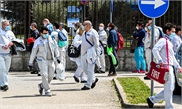Global death toll hits new high as oil producers extend cuts
EU to resume tourism in July
The global death toll from the coronavirus neared 400,000 on Sunday with fatalities accelerating in Latin America, as oil-producing countries agreed to extend output cuts to offset a collapse in prices caused by the pandemic.

Brazil has the world's third-highest death toll but President Jair Bolsonaro has threatened to pull out of the World Health Organization (WHO) over "ideological bias," following the example of the US.
He is among those arguing that the economic damage lockdowns are causing is worse than the virus itself - and the oil industry has been hit particularly hard.
OPEC agreed on Saturday to extend an April deal to cut production through July, aiming to foster a recovery in oil prices after they were pummelled by slumps in demand caused by virus restrictions.
Governments are also increasingly focused on repairing the economic damage, and even hard-hit European countries are now opening their borders and allowing people to return to work.
Factories in India are struggling to restart because of labor shortages, as the country slowly emerges from a strict nationwide lockdown that sent millions of migrant laborers back to their far-flung home villages.
The worst health crisis in more than a century has infected nearly 6.9 million globally and forced tens of millions out of work just in the US, the world's hardest-hit nation. But US President Donald Trump said his country was bouncing back. "We had the greatest economy in the history of the world. And that strength let us get through this horrible pandemic, largely through, I think we're doing really well," he told reporters.
As the country reels from a second weekend of massive protests against racism and police brutality, Trump - facing reelection in November - reiterated his calls to further ease stay-at-home measures.
It followed surprisingly upbeat employment numbers that showed the country gained 2.5 million jobs in May.
In Europe, badly-hit countries slowly continued on a path toward a post-pandemic normal, also seeking to revive key tourist sectors in time for the summer.
The European Union said it could reopen borders to travelers from outside the region in early July, after some countries within the bloc reopened to European visitors.
In France, the Palace of Versailles reopened without the US and Chinese tourists that usually make up a third of its visitors.
The country also marked the anniversary of the 1944 D-Day landings with a fraction of the big crowds seen in previous years, owing to strict social distancing restrictions.
Elsewhere, the golf's Asian Tour became the latest international body to announce plans for a restart, after the pandemic threw the world sports calendar into disarray. Play is expected to resume in September.

A visitor takes photos in the Chateau de Versailles (Palace of Versailles) on its reopening day near Paris, France on Saturday after 82-day closure following the lockdown to prevent the spread of the COVID-19. Photo: Xinhua
Brazil has the world's third-highest death toll but President Jair Bolsonaro has threatened to pull out of the World Health Organization (WHO) over "ideological bias," following the example of the US.
He is among those arguing that the economic damage lockdowns are causing is worse than the virus itself - and the oil industry has been hit particularly hard.
OPEC agreed on Saturday to extend an April deal to cut production through July, aiming to foster a recovery in oil prices after they were pummelled by slumps in demand caused by virus restrictions.
Governments are also increasingly focused on repairing the economic damage, and even hard-hit European countries are now opening their borders and allowing people to return to work.
Factories in India are struggling to restart because of labor shortages, as the country slowly emerges from a strict nationwide lockdown that sent millions of migrant laborers back to their far-flung home villages.
The worst health crisis in more than a century has infected nearly 6.9 million globally and forced tens of millions out of work just in the US, the world's hardest-hit nation. But US President Donald Trump said his country was bouncing back. "We had the greatest economy in the history of the world. And that strength let us get through this horrible pandemic, largely through, I think we're doing really well," he told reporters.
As the country reels from a second weekend of massive protests against racism and police brutality, Trump - facing reelection in November - reiterated his calls to further ease stay-at-home measures.
It followed surprisingly upbeat employment numbers that showed the country gained 2.5 million jobs in May.
In Europe, badly-hit countries slowly continued on a path toward a post-pandemic normal, also seeking to revive key tourist sectors in time for the summer.
The European Union said it could reopen borders to travelers from outside the region in early July, after some countries within the bloc reopened to European visitors.
In France, the Palace of Versailles reopened without the US and Chinese tourists that usually make up a third of its visitors.
The country also marked the anniversary of the 1944 D-Day landings with a fraction of the big crowds seen in previous years, owing to strict social distancing restrictions.
Elsewhere, the golf's Asian Tour became the latest international body to announce plans for a restart, after the pandemic threw the world sports calendar into disarray. Play is expected to resume in September.


